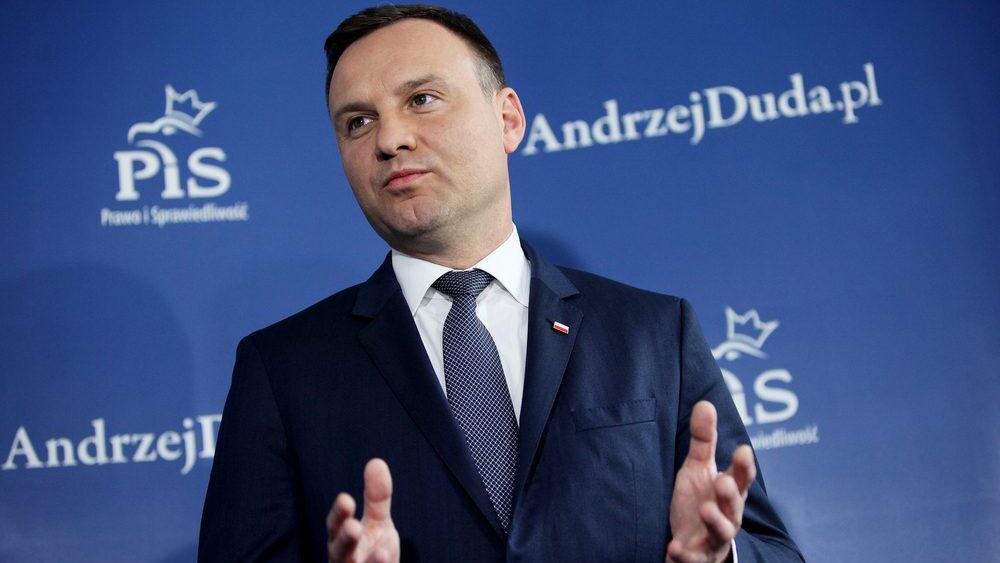
Polish President Andrzej Duda
Photo: praszkiewicz / Shutterstock.com
Polish President Andrzej Duda has defended his decision to entrust Mateusz Morawiecki with the task of forming a government despite the fact that the liberal-globalist opposition coalition secured a parliamentary majority in last month’s election, underscoring that the move is in line with a tradition upheld by his predecessors.
In an interview titled “Tusk will not be my prime minister” published on Monday, November 20th, by the Warsaw-based, conservative weekly magazine Sieci, Duda stated:
Under the current constitution, all presidents, my predecessors, have always entrusted the mission of forming a government to the winning party. This year’s elections were won by Law and Justice.
The president’s decision to uphold conventional government protocols stands in contrast with near-incessant claims made by globalist Eurocrats and opposition liberals over the course of the PiS’ eight-year rule that the party has contempt for the rule of law and skirts the Constitution.
Although Law and Justice (PiS) did garner the largest share of the vote (35.4%) in Poland’s parliamentary elections on October 15th, gaining 194 seats in the 460-member lower house, it fell well short of the amount needed to secure a majority, and all other political parties have ruled out forming a coalition with it. The opposition coalition, meanwhile, won 248 seats and therefore positioned itself to have its leading candidate, Donald Tusk, take over the country’s premiership.
Further explaining why he decided to give his fellow PiS party member and the current Polish Prime Minister Mateusz Morawiecki the first chance to form a new government, Duda told the publication:
The representatives of the Civic Coalition, the Left, and the Third Way did not convince me that it is worth giving up the good parliamentary tradition, according to which the victorious group is the first to be given the mission of forming a government.
I wanted to see a common and unified program. Hear as many specifics as possible. This was missing. Secondly, during these talks, on very important, fundamental issues, representatives of individual political camps, which today declare to form a coalition, said completely different things. For example, regarding key issues relating to Poland’s sovereignty.
As The European Conservative has previously reported, Donald Tusk, if he does assume the premiership, is expected to have a challenging time balancing the interests—and therefore maintaining the stability—of the ideologically disparate coalition that’s composed of three alliances and more than a dozen political parties spanning the political spectrum.
Tusk responded to Sieci’s interview with Duda in a post to X, formerly known as Twitter, on Sunday, November 19th, writing: “Tusk won’t be my PM, President Duda said. I can confirm. I won’t.”
„Tusk nie będzie moim premierem” – powiedział prezydent Duda. Potwierdzam. Nie będę.
— Donald Tusk (@donaldtusk) November 19, 2023
Tusk’s relationship with Duda and PiS is expected to be highly contentious in the months and years ahead, as it has been in the past, and perhaps even more so. In September, Tusk’s party said that, if victorious in October’s elections, it would put those accused by his alliance of impropriety during PiS’ rule, including Duda, before a state tribunal. “Violations of the constitution and the rule of law will be quickly accounted for and judged,” the Civic Coalition stated.
Social scientist Jarosław Flis, a professor at the Jagiellonian University in Krakow, says Tusk’s relationship with Duda “may even be worse” than it was with past PiS-nominated president, Lech Kaczyński, during his first term as prime minister between 2007 and 2010.
Flis predicts that Duda will block attempts by Tusk’s new government to scrap reforms PiS implemented during its eight-year tenure, including its judicial reforms that resulted in punitive action being taken by the EU Commission.
PiS MEP Ryszard Legutko also believes the traditionally hostile relationship between Duda and Tusk will continue. “For years, Tusk and his party have been showing contempt towards the PiS government and the president,” he said, adding that he expected the relationship between the two to look no different going forward.
